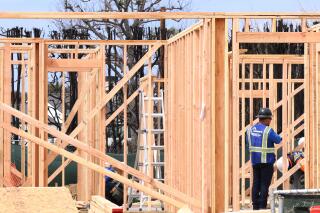Los Angeles Implements AI Technology for Wildfire Rebuilding Permits
In a pioneering effort, Los Angeles city and county building officials have begun using artificial intelligence (AI) to assist with the permitting process for homes destroyed in January’s wildfires. The AI software, donated by wildfire recovery foundations, aims to accelerate a process that has been criticized for moving too slowly.

When survivors of the January wildfires in Los Angeles County apply to rebuild their homes, they may first interact with AI. The technology will help city and county building officials review permit requests, checking for basic compliance with zoning and building codes, suggesting corrections, and providing standardized reports for human plan checkers to review.
The initiative comes after approximately 13,000 homes were lost or severely damaged in the Eaton and Palisades fires. Many families are eager to return to their homes as quickly as possible. Just eight days after the fire began, the city received its first home rebuilding application in Pacific Palisades.

The AI software was purchased by wildfire recovery foundations and developed by Australian tech firm Archistar. It is believed to be the first large-scale use of such permitting technology nationwide after a natural disaster. L.A. County officials hope it will reduce the time employees spend on menial tasks like measuring building heights and counting parking spaces.
“We see our planners doing things that are more impactful for our fire survivors,” said Mitch Glaser, an assistant deputy director in the county’s planning department. Disaster relief and government technology experts are encouraged by the initiative, seeing municipal permitting as an ideal application for AI technology.
However, they caution that human oversight is necessary for the AI software to be effective. The city and county must integrate the technology into existing systems and correct any implementation errors promptly. Otherwise, the software could create additional bureaucratic hurdles or limit property owners’ options through overly rigid code interpretations.
“This could be fabulously successful and I hope it is,” said Andrew Rumbach, a senior fellow at the Washington-based Urban Institute. “But experimenting with technology in the context of people who’ve lost a lot is risky.”
Following the fires, leaders at all government levels pledged to streamline rules for property owners to rebuild. L.A. Mayor Karen Bass noted that the region’s recovery is “on track to be the fastest in modern California history.” A mayoral spokesperson stated that the building department is completing initial permitting reviews twice as fast as before the fire.

Over 200 Pacific Palisades property owners have submitted applications to rebuild or repair their homes. The city has approved 11% of these applications. L.A. County, responsible for permitting in unincorporated areas like Altadena, has received 486 zoning review applications, with seven building permits approved as of the latest update.
Experts expect AI technology in disaster permitting to become mainstream soon. “I’m confident there is no way back,” said Sara Bertran de Lis, director of research and analytics at Johns Hopkins University’s Bloomberg Center for Government Excellence.
L.A. County plans to implement the Archistar software within six weeks after programming and testing. The city aims to do so within “the next couple of months.” While the technology promises to expedite the rebuilding process, experts stress the importance of human oversight to address nuances in zoning and building codes.

